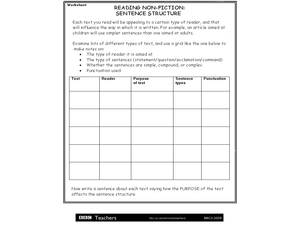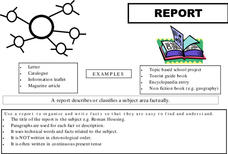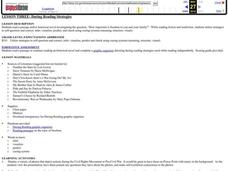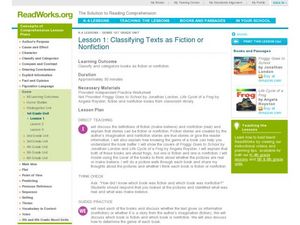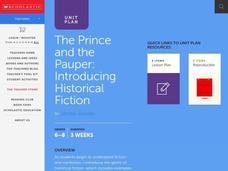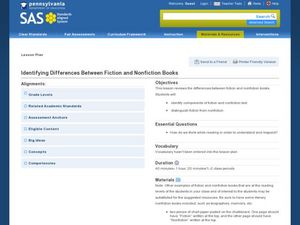Curated OER
Introduce Vocabulary: Cross a Bridge (Hunter)
What does suspension mean? Learn this and other bridge-related vocabulary as scholars listen to Ryan Ann Hunter's nonfiction book, Cross a Bridge. This strategy can be applied to any book. Before reading, acquaint pupils with the new...
Curated OER
Analyzing Nonfiction Text Elements - Editorials
Examine the text features of non-fiction. Start the lesson by reading editorial samples provided by their instructor and analyze the texts for word choice, details, and organization. An editorial example and graphic organizer are...
Curated OER
Reading Non-Fiction: Sentence Structure
Use this worksheet to help make explicit the connection between sentence structure, audience, and author's purpose. Readers track and find patterns in sentence structure in various nonfiction texts, and connect it to the purpose of the...
Curated OER
Non-Fiction Text Features
Distinguish between textual features of non-fiction in the book The Lewis and Clark Expedition and in the non-fiction story "Ta-Na-e-Ka." Third graders create posters and participate in group discussions to show their understanding of...
Syracuse City School District
Summary of Fiction and Non-Fiction Text
Somebody Wanted But So Then (SWBST)? Yes! Here's a great strategy for teaching young readers how to summarize narrative text. In addition, the packet includes exercises that show kids how to summarize nonfiction text using the classic...
Curated OER
Comprehension Strategy Instruction: Questioning
Providing learners with a solid armory of reading strategies is a good way to help them build better reading comprehension. The teacher will model how to use a questioning checklist to better understand what she is reading. Pupils will...
Curated OER
Fiction vs. Nonfiction
Students explore fiction and nonfiction writing. They identify the elements of fiction in a short story and identify the criteria necessary in a nonfiction piece. Students distinguish the author's purpose in an expository text,...
Curated OER
Non Fiction Posters
A set of very useful posters (in PDF) describing different types of non-fiction texts is here for you. While there isn't an activity, per se, in these worksheets, they could be used as a handy reference for learners who are engaging in...
Curated OER
Blending Fiction and Nonfiction to Improve Comprehension and Writing Skills
Pupils explore a content area by reading both fiction and nonfiction texts on the topic. They do more research online about the topic. After comparing the texts, they create their own written original work, using both narrative and...
Curated OER
Comparing and Contrasting Fiction and Nonfiction Using Graphic Organizers
Students compare and contrast fiction and non-fiction selections. In this writing skills lesson, students use different forms of graphic organizers to compare "The Three Little Pigs," to Wiesel's Night.
Curated OER
Irony in Poetry and Prose (Fiction and Non-fiction Texts)
Middle and high schoolers examine the impact of irony in poetry and prose. In this figurative language lesson, they read instructor-selected literature and identify uses of irony. Then they discuss how irony enhances literature.
PBS
Reading Adventure Pack: Money
Money is the topic of a reading adventure pack. Third graders read two books—one fiction, one non-fiction—and complete a series of activities. Learners draw an item they wish to save money for, examine coins to start a collection, and...
Curated OER
Using Details From The Text
Begin this expository writing activity by reading a non-fiction book of your choice and modeling expository writing. The plan suggests The Trip of a Drip by Vicki Cobb but notes that other texts will work. Learners then choose a...
Curated OER
Creating a Science Fiction Story
As the culminating activity in a unit study of science fiction, young writers demonstrate their understanding of the genre by producing their own graphic novel. After deciding on the main elements of their story, individuals use a comic...
Great Schools
A Questionnaire: What Do You Like to Read?
What do your fifth graders know about types of fiction, nonfiction, and poetry? Find out as they fill out this questionnaire that requires them to list authors and texts that exemplify each genre. Not only will you be able to assess what...
Curated OER
During Reading Strategies
"How important is freedom to you and your family?" The guiding question becomes much more powerful after your class reads and responds to a passage from a historical novel. While reading the passage, they complete a graphic organizer...
Curated OER
Review of Literary Devices
Sixth graders review literary devices. They use both fiction and nonfiction texts to review metaphor, simile, alliteration, imagery, symbolism and personification. This lesson has a scripted guide for the teacher to follow.
Curated OER
Lesson 1: Classifying Texts as Fiction or Nonfiction
First graders characterize fiction and non-fiction books, they discover the characteristics of each type of book and compare two books (one fiction & one nonfiction) about the same subject. They make a list that describes what makes...
Curated OER
Review Parts of a Book
Begin the year with a review of the parts of a book. Exercises in the unit plan ask emergent readers to identify the information on the cover of a book and on the title page, to explain the purpose of a table of contents, and to describe...
Curated OER
Determining Author's Point of View: The Sneeches
Determine the author's point of view in a text. Young readers read Dr. Seuss' The Sneeches and identify the author's purpose in the story. They identify persuasive techniques in writing, asking and answering questions to better...
Curated OER
Fiction and Nonfiction
Fourth graders differentiate between fiction and nonfiction using the books "Sarah Plain and Tall" and "A Day in the Prairie." They develop a list of information that they learn from the text, and create an information web. Students...
Curated OER
The Prince and the Pauper
Mark Twain, the famous American author, is often studied in the school system. Use "The Prince and the Pauper" to analyze the differences between the text and its video version. This activity includes several culminating project ideas...
Curated OER
Sign of the Beaver: Book Club Discussion
Good question are the heart of great discussions. To prepare for a book club discussion, introduce young readers to the characteristics of good conversation-starting questions. Practice crafting questions for a text the class has...
Curated OER
Identifying Differences Between Fiction and Nonfiction Books
Students explore the differences between fiction and non-fiction book. In this genre study lesson, students read examples of fiction and non-fiction and identify the characteristics of each genre. Students list the characteristics on a...




